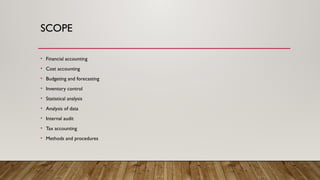Management accounting- Introduction, objectives
- 2. MEANING • It is the study of managerial aspects of accounting • It is a tool in the hands of management to exercise decision making.
- 3. DEFINITION • Management accounting is the presentation of accounting information in such a way as to assist management in the creation of policy and in the day to day operations of an undertaking - ICMA
- 4. CHARACTERISTICS • Providing financial information • Cause and effect analysis • Use of special techniques and concepts • Decision making • No fixed conventions • Achievement of objectives • Improving efficiency • Forecasting • Providing information and not decisions
- 5. SCOPE • Financial accounting • Cost accounting • Budgeting and forecasting • Inventory control • Statistical analysis • Analysis of data • Internal audit • Tax accounting • Methods and procedures
- 6. OBJECTIVES & FUNCTIONS • Presentation of data • Aid of planning and forecasting • Help in organising • Decision making • Effective control • Communication of management policy • Effective control • Incorporation of non financial information • Coordination • Motivating employees
- 7. DIFFERENCE BETWEEN FINANCIAL ACCOUNTING & MANAGEMENT ACCOUNTING Basis Financial Accounting Management Accounting Purpose It is to ascertain profit and loss by preparing the P&L a/c reveal the financial position through the balance sheet and present them to owners, creditors, government etc. It is concerned with external reporting. It is to provide information to management for decision making o internal operations. It is concerned with internal reporting. Nature of information used Records transaction as and when occur i.e., recording past Management accounting is concerned with future plans and operations. It is subjective and relates to future Analysis & Interpretatio n of data It analyses data of the business as whole i.e., provides consolidated information of the whole enterprise Evaluates the performance of different departments, divisions and as per the requirement of the management Flexibility Financial accounts are prepared as per the guidelines laid by companies act and income tax act Management accounts follows the requirement of the management in preparation of various statements. Legal requirement Financial accounting has become compulsory as per the statutory requirements. It is a voluntary adoption by the management to function effectively.
- 8. DIFFERENCE BETWEEN FINANCIAL ACCOUNTING & MANAGEMENT ACCOUNTING Basis Financial Accounting Management Accounting Frequency of reporting Periods reporting is the feature of financial accounting. Accounts are financial at the year end to be reported to the external users. Frequent reporting of performance of various activities is the feature of management accounting. Prompt and quick reporting is the main feature. Emphasis of principles Financial accounting records the transactions as per established conventions and principles. Management accounting does not have rigid principles. The manner of presentation depends on the requirement of firm. Audit Financial statements prepared under financial accounting system are published for the information of general public incase of public limited companies. The financial statements are audited by a Chartered Accountant The management accountant accounting, statements and reports are means for internal purpose and they are not subject to audits Format of statements In financial accounting system the financial statements are prepared under different forms as revenue, capital, personal accounts, and property accounts etc., In management accounting expenses and incomes are reported by various responsibility entries. Unit of Account Financial accounting considers the whole enterprise as a single unit of account. It prepared under financial accounting system reveal the operating results of an entire firm. Management accounting presents reports relating to the whole concern and also division wise performance is revealed.
- 9. DIFFERENCE BETWEEN FINANCIAL ACCOUNTING & COST ACCOUNTING Basis Financial Accounting Cost Accounting Purpose It is to provide information to management to management for efficiently performing the functions of planning, directing, controlling. The main objective is to ascertain and control the cost of products or services. Emphasis It deals with future projections on basis of historical and present cost data It is based on both historical and present data Principles and Procedures No such prescribed practice are followed in management accounting. Estimated procedures and practices are followed in cost accounting. Data used It uses both qualitative and quantitative information It uses only quantitative information Scope It includes financial accounting, cost accounting, budgeting, tax planning, reporting to management Cost accounting is concerned mainly with cost ascertainment and control.
- 10. TOOLS & TECHNIQUES • Financial policy and accounting • Analysis of financial statements • Historical cost accounting • Budgetary control • Standard costing • Marginal costing • Management information system
- 11. MERITS • Increase in efficiency • Effective planning • Performance evaluation • Profit maximisation • Reliability • Elimination of wastage • Effective communication • Employee moral • Control & co ordination
- 12. LIMITATIONS • Dependence for basic records • Personal bias • Management accounting is only a tool • Management accounting provides only data • Broad based scope • Resistance to change • Costly to install • Evolutionary stage
- 13. INSTALLATION OF MANAGEMENT ACCOUNTING SYSTEM • Organisation manual • Preparation of various forms and reports • Requisite staffing • Classification of accounts • Setting up of cost centres • Introducing management accounting techniques • Providing for usage of operation research techniques
- 14. MANAGEMENT ACCOUNTANT • Officer who is entrusted with management accounting function in an organisation is known as management accountant • Caters to the informational needs of different management levels • Essential to determine the status of management accountant in the organsation
- 15. FUNCTIONS • Planning for control • Reporting • Evaluation • Administration of tax • Appraisal of external effects • Protection of assets
- 16. DUTIES • Collection of information • Evaluation of information • Interpretation of information • Reporting of information















